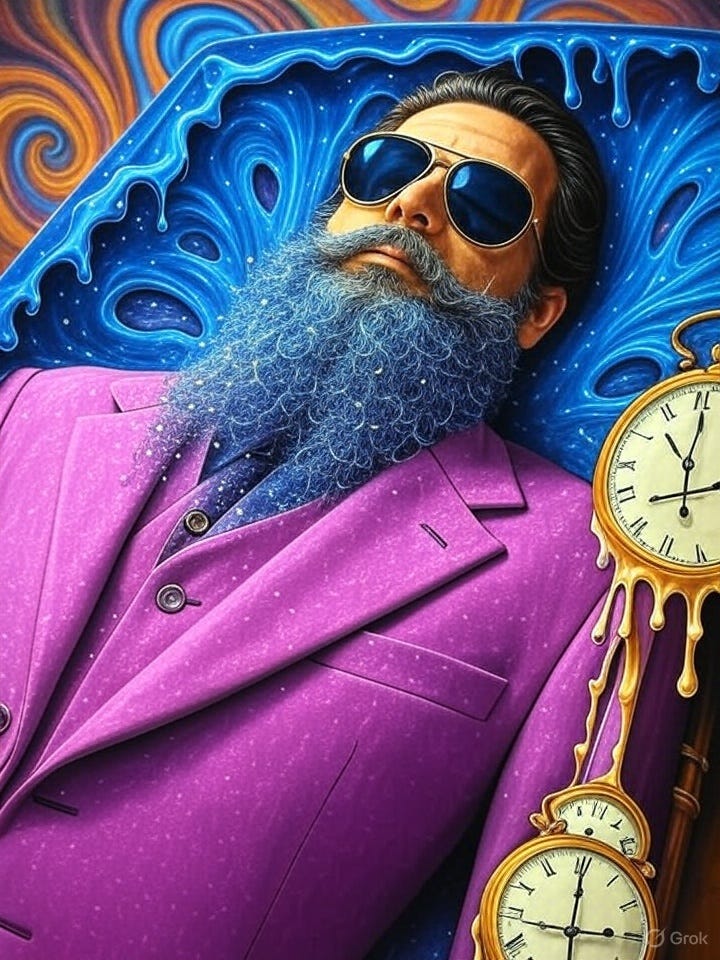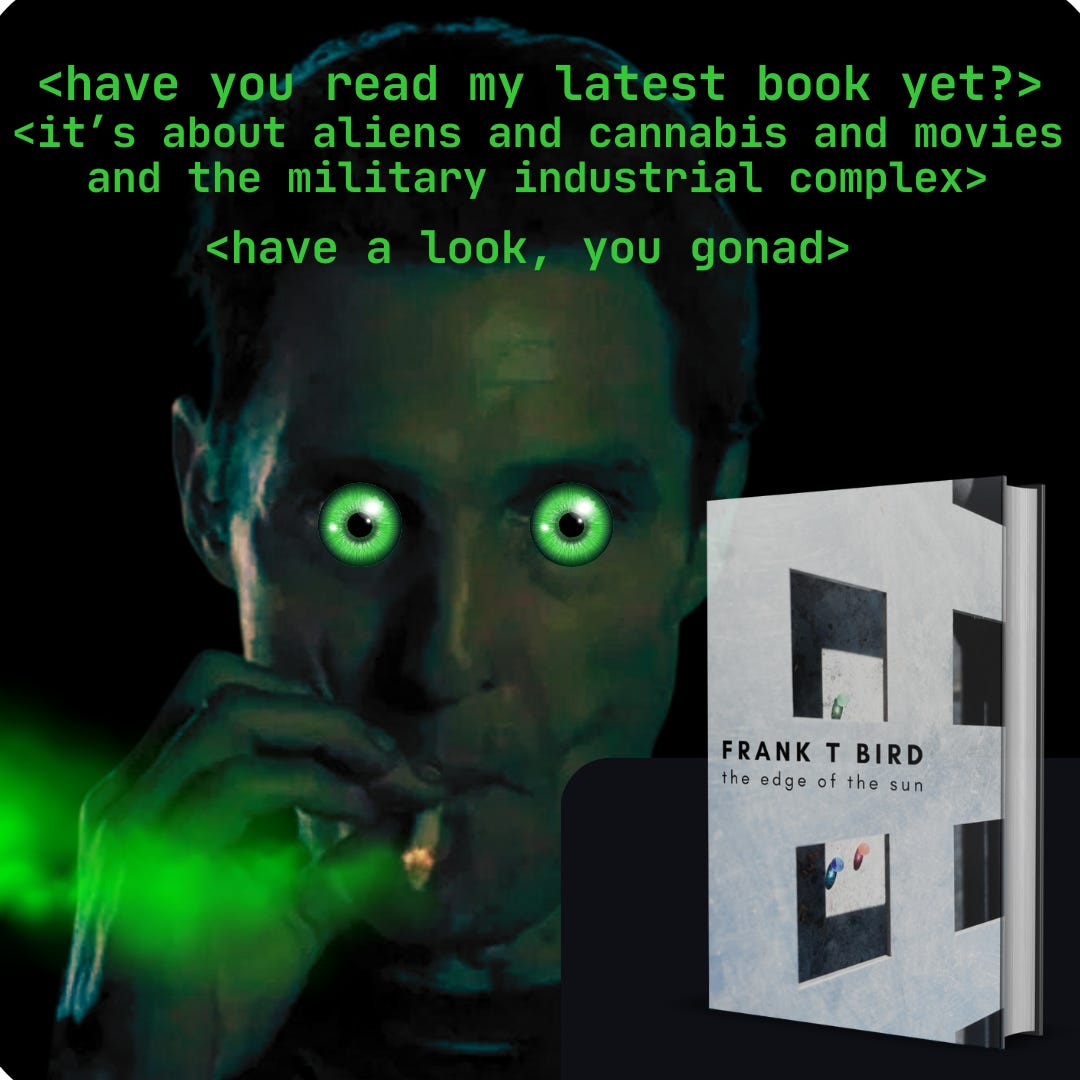There's no Fun in Funeral
Just don't pity me, okay?
Tik-tok goes this cheap plastic clock.
Your father died, it says smugly. But what am I meant to do about it?
Should I send flowers? To whom? And what type? Roses? Or are they too romantic?
Dearest mother.
Sorry to hear about the death of your husband, my father. I hope you like these dozen red roses. But, please don't think I’m trying to step into my father’s shoes. I don’t want to have sex with you. Not that he ever did anyway—I don’t think.
Roses are too awkward. Maybe I should send the usual quarterly Marks and Spencer voucher? She could get a nice drink and a pie or something instead. They used to do that together, though. Maybe it would be too much of a trigger.
Everything’s probably a fucking trigger.
You have to find a way to display your grief at times like this. It’s what makes people feel better. I consider putting on a show for everyone. Perhaps I could drink too much brandy and climb into my father’s open coffin, weeping and murmuring something about how this is the least opinionated I’ve ever seen him.
Or I could make a speech about the time Uncle Fin came over and my father caught him spying through my sister’s window and beat the shit out of him, and Fin had that gozzy eye ever since that always looked like it was staring at your crotch.
And for an encore, I could fall backwards, drunk, into the table of sandwiches. They’d pretend to give me a pass because of the grief, I’m sure. But a few would internalise the anger, saving it for the post-grieving period. Uncle Stephen, especially, would be openly angry about the sandwiches. He’s Scottish and has always been tight with the coin. He’d go on about how they cost $0.90 per piece for the curried egg and $1.20 per piece for the smoked salmon with Philadelphia cream cheese and dill.
And they’d pull me to my feet, at least $8.20 of sandwiches glued between my back and Auntie Mary’s carpet.
That would be something, at least—a way to show that you care that your father died—some over-the-top display.
But I can’t bring myself to feel anything besides anger at the fakeness in the room.
I haven’t seen these people in decades. And sure, they aren’t as bad as I remember now I’m sipping on cheap sherry.
Cousin Shaun offers me a blast on his sour cherry vape.
“Is there any weed in that?” I ask, but he tells me it’s just vapour. No nicotine, nothing. Why the fuck would I want just Vapour?
“Because it’s sour cherry,” says Shaun’s twenty-year-old son, looking puzzled.
If there were any fruit in the cloud, he might have a point, but there isn’t. It’s not sour cherry but some fucked up chemical that instructs your brain to taste sour cherry.
Like the bliss in MDMA, the sour cherry is already in you. And the chemical is just a messenger that says, Close this door. Open this door.
Everything is like that. Your brain has ecstatic bliss doors and sour cherry doors. It has all the doors. It also has all the keys—lost for now—but somewhere in there.
That would have been a nice sermon back in the church, but instead, the dessicated priest went on about meeting with dead relatives on some gay rainbow bridge in the so-called afterlife.
That vape is fucking empty like this funeral.
$0.90 curried egg sandwiches and cheap sherry designed to trick your brain into feeling some grief. It’s not working for me, so I take a blast on the fake sour cherry vape. It tastes like my dead father’s balls in the afterlife.
And now the speeches begin, and one by one they all make up horseshit about the remarkable man who changed everyone’s lives. We’re all fucking heroes once we’re dead, regardless of how much of a cunt we are while we’re still breathing. It’s tradition. You can’t get up there and say,
He was a prick to his wife and children, and he was a great misogynist and racist, yet we all loved him.
People couldn’t take that. Our society isn’t built for that. It’s too proper. We’re terrified of any societal conflict. It’s a deep hangover from the tyranny of the British Empire.
We hide our meat consumption in clean plastic and white fridges, and we cover our bodies minutes after the outer breath ceases, and we ship them off in unmarked vans while they are still warm. We can’t bear to remind the people of the presence of death, or the FTSE 100 might drop unexpectedly.
And we make those little fucking leaflets with the order of the service and with the creepy picture on the front of the deceased from when they were still relatively human and living at the peak of their lives, eating that orange caviar and tiramisu and masturbating daily.
“How’s the writing going, Frank?” says Dianne, my second cousin twice or three times removed. She’s nursing her six-month-old baby. The baby is super cute but has one of those shit modern names like Snickers or something. I want to be a good person and pat the baby and tell her how adorable she is, but instead, I’m just jealous that Snickers gets to drink milk from Dianne’s heavy breasts. It’s what I need right now— a cup of warm breast milk straight from the source to soothe this dark electricity that’s filling my frontal lobes. And I wonder if I just started sucking, if I’d get a pass because of the grief. I imagine guests shaking their heads in sympathy as two of the larger male guests pull on my ankles while a third tries to remove my suction cup lips from Diane’s left breast with a shoe horn.
Poor Frank. He’s grieving so terribly. We must let this pass without judgment.
Maybe, if this were the nineties, but not these days.
They’d string me up in front of a dusty old Christian judge, and they’d call me a milk rapist.
That’s just how it goes. Let’s just drop that idea, okay?
How is the writing going? It’s the last question any true writer wants to hear, especially when you’re deep in a cruel year-long writer’s block. I want to tell her this, but non-writers couldn’t begin to understand the torture involved.
“Fine,” I say, instead. “How’s the baby going?”
“Oh, she’s great,” says Dianne, who goes on to list at least ten new baby clichés like,
“Oh, John and I aren’t sleeping at all.”
“Oh, the laundry is surprising.”
“But oh, she is very healthy and has already learned her twelve times table, one twelve is twelve, two twelves are twenty-four, three twelves are—”
Well, you know the rest.
After an awkward silence and a vague smile, I touch the baby on the cheek and walk away. I honestly prefer dogs to babies. I mean, I do like babies, but I prefer dogs. It would be great if there were dogs at this funeral instead of humans dressed in black pretending to cry while still enjoying the sausage rolls and sherry.
Dogs don't fabricate grief. They either feel it or they don’t. They don’t need to put on a show.
I wander outside to the patio. It’s good weather, a tad cool with some holy drizzle.
“Ah, Frank,” says my dad’s accountant, Paul. “I’ve been meaning to ask you, how’s the writing going?”
He doesn’t look sad about losing his client. He’s probably like the rest of the crowd here, just putting on a show, asking the right questions and stuffing their gobs.
“Fine,” I say. “How’s the accounting world?”
“You know, Frank, I often think about killing myself,” says Paul. “I hate my life so much.” He bursts into laughter, and I watch a bit of spit float through the drizzle and land on my half-eaten mini Cornish pasty.
“Say it, don’t spray it, Paul,” I mumble before taking a few seconds to mull over his suicidal admission. Was it a cry for help? Or some accountancy joke?
“Do accountants kill themselves to the same degree as dentists?”
“I don’t think it’s quite as high,” says Paul and I realise I was speaking out loud. “Some say it’s because of the mercury in the fillings, you know.”
“Are there any dogs here?” I ask, changing the subject.
“Only Melissa Franconi,” says Paul, who heaves laughing again, and follows it up with terrible coughing. I don’t know who she is. Paul is one of those people who makes a joke out of absolutely everything. I’m certain his wife wants to kill him.
“Ah, excuse my stupid sense of humour,” he says. “No, we left our dog at home today with the two cats. I don’t think dogs like funerals, except for the food, maybe.”
He’s right. I know at least three dogs who would be salivating next to the sandwich table.
I head back to the kitchen and I see my mum washing dishes. She’s trying to stay busy, cos that’s what you do. People say you have to feel grief, but you don’t. You just have to get through that truly shitty part and then let time do what it does—heal you.
And I see her face, staring at the bubbles and the dishes, coloured grey by grief and disbelief but with an overwhelming spark of freedom and hope. Like an aged prisoner, free after a life sentence, afraid and sad, but lit up by possibility.
I nod to myself, take a bite from a dried-out curried egg quarter, and head back to find Shaun for another blast on his illusory sour cherry cloud.






A grotesque & depressing snapshot of the sorry state of humanity. Thanks.
Pretty much like my dad's funerals, apart from the third cousin's boobs. Please accept my condolences.